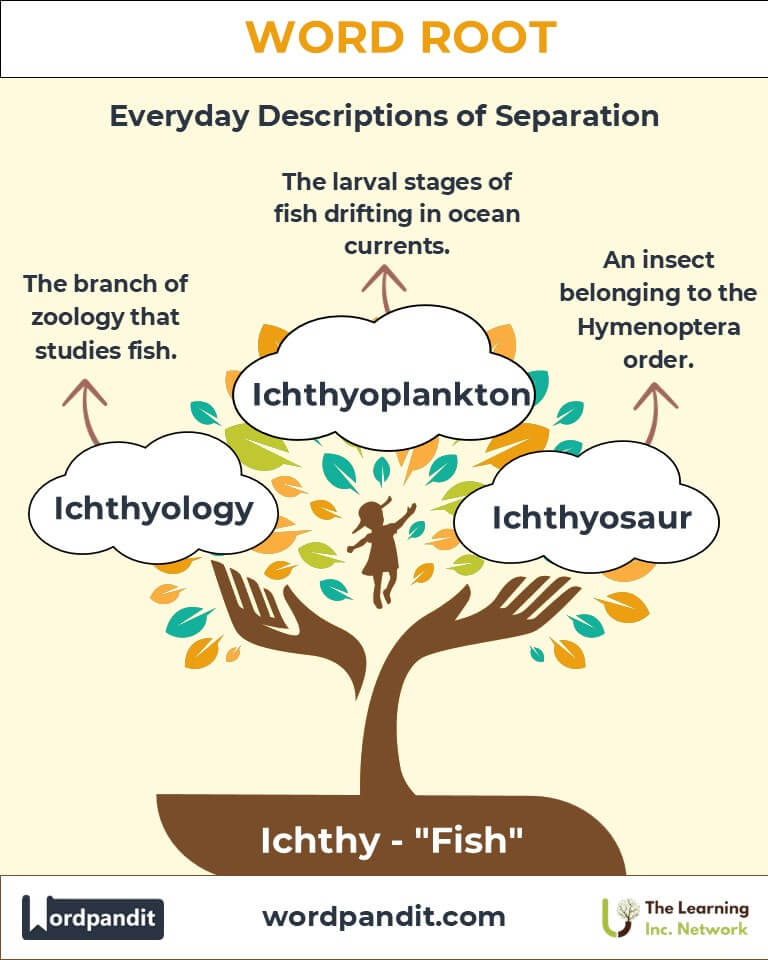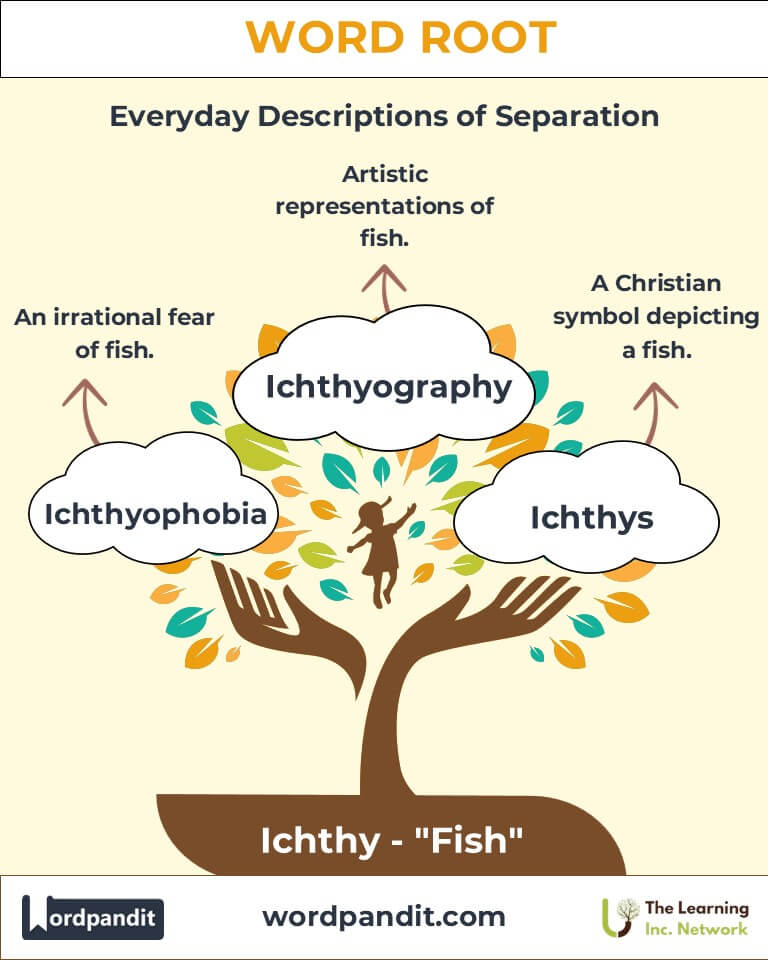Ichthy: Exploring the Root of Aquatic Life
Byline: Dive into the fascinating world of the root "Ichthy," derived from the Greek word for fish. From ichthyology, the scientific study of fish, to ichthyoid, describing fish-like features, this root swims through language, connecting us to aquatic biology, art, and culture.

Table of Contents
- Introduction: The Essence of "Ichthy"
- Etymology and Historical Journey
- Mnemonic: Unlocking the Power of "Ichthy"
- Common "Ichthy"-Related Terms
- "Ichthy" Through Time
- "Ichthy" in Specialized Fields
- Illustrative Story: "Ichthy" in Action
- Cultural Significance of "Ichthy"
- The "Ichthy" Family Tree
- FAQs about the "Ichthy" Root
- Test Your Knowledge: "Ichthy" Mastery Quiz
- Conclusion: The Living Legacy of "Ichthy"
Introduction: The Essence of "Ichthy"
What do ichthyosaurs and ichthyology have in common? They share the root "Ichthy," pronounced ik-thee, which means "fish" in Greek. This root flows through language, enriching our vocabulary with words that connect us to marine life. From scientific discoveries to cultural expressions, "Ichthy" symbolizes our enduring fascination with the underwater world.

Etymology and Historical Journey
The word root "Ichthy" originates from the Greek word ichthys, meaning fish. Ancient Greek philosophers and naturalists like Aristotle first used the term to categorize aquatic creatures. Over time, "Ichthy" found its way into scientific nomenclature, solidifying its place in disciplines like ichthyology, which emerged in the 16th century to classify and study fish species.
Mnemonic: Unlocking the Power of "Ichthy"
To remember "Ichthy," visualize a shimmering school of fish forming the word in the ocean's depths.
Mnemonic Device: "Ichthy swims into words like fish in the sea!"
Common "Ichthy"-Related Terms
- Ichthyology (ik-thee-ol-uh-jee): The branch of zoology that studies fish.
- Example: "Ichthyology has revealed fascinating facts about deep-sea fish."
- Ichthyoid (ik-thee-oyd): Resembling or relating to fish.
- Example: "The creature's ichthyoid features suggested it evolved in water."
- Ichthyosaur (ik-thee-uh-sawr): An extinct marine reptile resembling a fish.
- Example: "Fossils of ichthyosaurs show their fish-like adaptations."
- Ichthyophage (ik-thee-oh-fayj): A fish eater.
- Example: "Ichthyophages are prevalent in aquatic food chains."
- Ichthyophobia (ik-thee-oh-foh-bee-uh): An irrational fear of fish.
- Example: "Her ichthyophobia made her hesitant to visit the aquarium."
"Ichthy" Through Time
- Ichthyosaur: Discovered in the early 19th century, this term highlighted the connection between reptiles and marine ecosystems.
- Ichthyology: Developed alongside the Renaissance's exploration era, ichthyology formalized fish classification, advancing marine science.
"Ichthy" in Specialized Fields
- Biology:
- Term: Ichthyoplankton
- Definition: The larval stages of fish that drift in ocean currents.
- Application: Critical in understanding fish population dynamics.
- Paleontology:
- Term: Ichthyosaur
- Definition: Fossils illuminate evolutionary adaptations to aquatic life.
- Application: Key to studying marine reptile evolution.
- Art and Culture:
- Term: Ichthyography
- Definition: Artistic representations of fish.
- Application: Found in cultural artifacts and scientific illustrations.
Illustrative Story: "Ichthy" in Action
Young scientist Mia spent her days studying ichthyoplankton to understand the effects of climate change on marine ecosystems. On a dive, she discovered a rare ichthyosaur fossil, bridging modern ichthyology with ancient history. Her work inspired her community to protect fragile aquatic habitats, proving that the "Ichthy" root connects past, present, and future.
Cultural Significance of "Ichthy"
Fish have symbolized abundance and mystery across cultures. The Christian ichthys symbol signifies faith, while ancient myths like Poseidon's ichthyomorphic steeds reveal our awe for marine life. Modern ichthyology continues to deepen our understanding of these iconic creatures.

The "Ichthy" Family Tree
- Osteo- (bone):
- Example: Osteichthyes (bony fish).
- Plankto- (drifting):
- Example: Ichthyoplankton (fish larvae).
- Morph- (form):
- Example: Ichthyomorphic (fish-shaped).

FAQs About the Ichthy Word Root
Q: What does the root "Ichthy" mean?
A: The root "Ichthy" is derived from the Greek word ichthys, which means "fish." It forms the basis of numerous terms in science and everyday language that describe fish or fish-related characteristics, such as ichthyology (the study of fish) and ichthyoid (fish-like).
Q: What is ichthyology, and why is it important?
A: Ichthyology is the branch of zoology that focuses on the study of fish, covering their anatomy, behavior, habitats, and evolution. This field is crucial for understanding marine ecosystems, conserving endangered fish species, and supporting sustainable fishing practices.
Q: What are ichthyosaurs, and how are they different from modern fish?
A: Ichthyosaurs were prehistoric marine reptiles that lived during the Mesozoic Era. Though they resembled fish in shape (hence the "ichthy" root), they were reptiles with lungs and gave live birth, unlike modern fish, which are primarily cold-blooded and lay eggs.
Q: What is ichthyophobia, and how does it manifest?
A: Ichthyophobia is an irrational fear of fish. It may stem from traumatic experiences, cultural beliefs, or the appearance of fish. Symptoms can range from anxiety at the sight of fish to avoiding bodies of water altogether.
Q: How does "Ichthy" contribute to scientific naming?
A: "Ichthy" appears in scientific terms like Ichthyornis (an extinct bird with fish-like features) and Osteichthyes (bony fish), reflecting how it is used to classify aquatic life. Its consistent use underscores the role of Greek roots in taxonomy.
Q: What is ichthyoplankton, and why is it significant?
A: Ichthyoplankton refers to the early life stages of fish, including eggs and larvae, that drift in ocean currents. Studying ichthyoplankton helps researchers understand fish population dynamics and the health of aquatic ecosystems.
Q: What role did ichthyosaur discoveries play in paleontology?
A: Ichthyosaurs provided early evidence of how some reptiles adapted to life in water. Their streamlined bodies and fish-like fins revealed convergent evolution, where unrelated species develop similar traits to adapt to similar environments.
Test Your Knowledge: Ichthy Mastery Quiz
1. What does the root "Ichthy" signify?
2. Which field studies fish?
3. What is an ichthyoid?
4. What does ichthyophobia describe?
5. Which ancient creature is related to the "Ichthy" root?
Conclusion: The Living Legacy of "Ichthy"
The root "Ichthy" dives deep into the language of aquatic life, linking ancient marine reptiles, modern fish studies, and cultural symbolism. As science progresses, "Ichthy" will continue to illuminate the mysteries of the underwater world, reminding us of the importance of preserving our planet's aquatic heritage.














